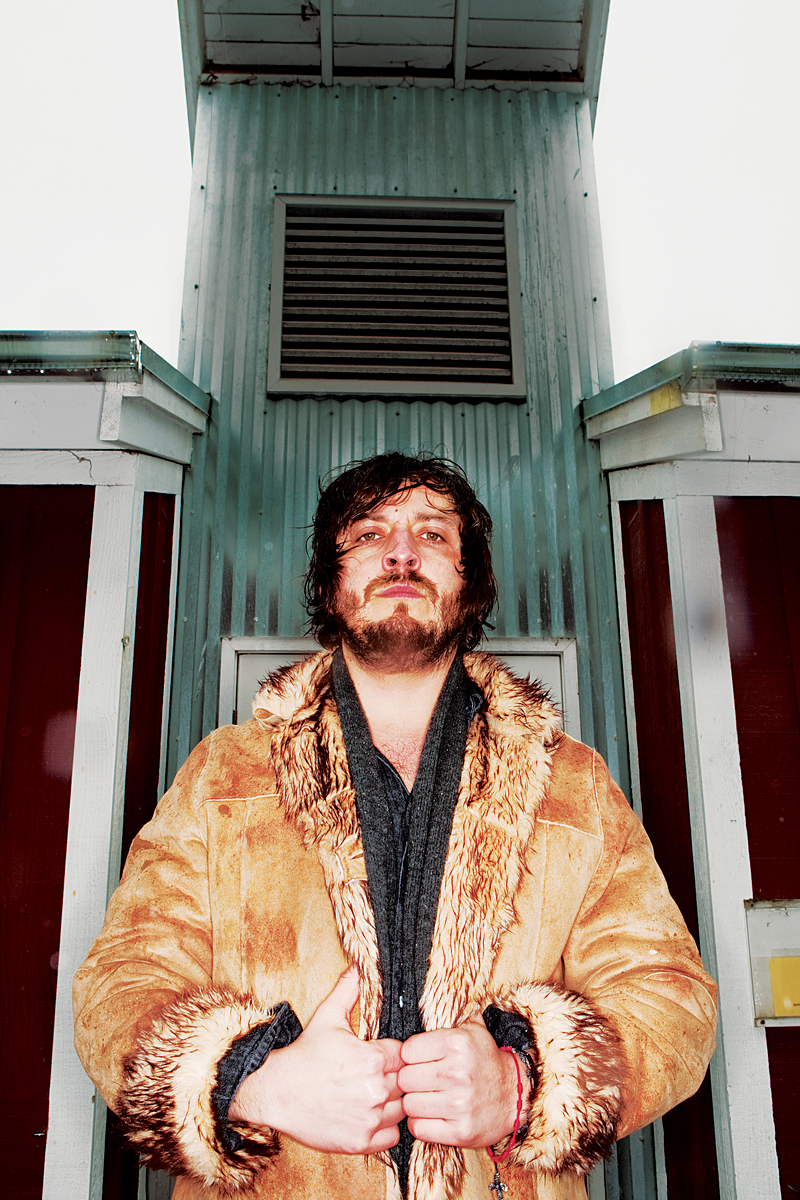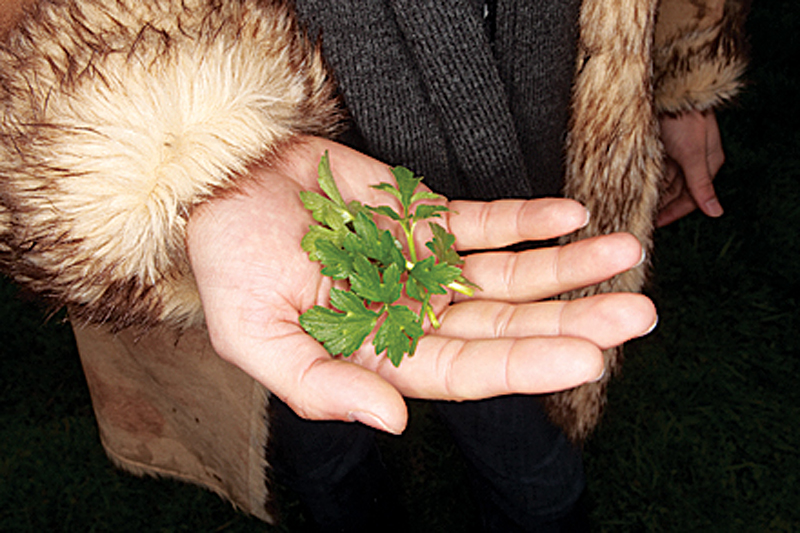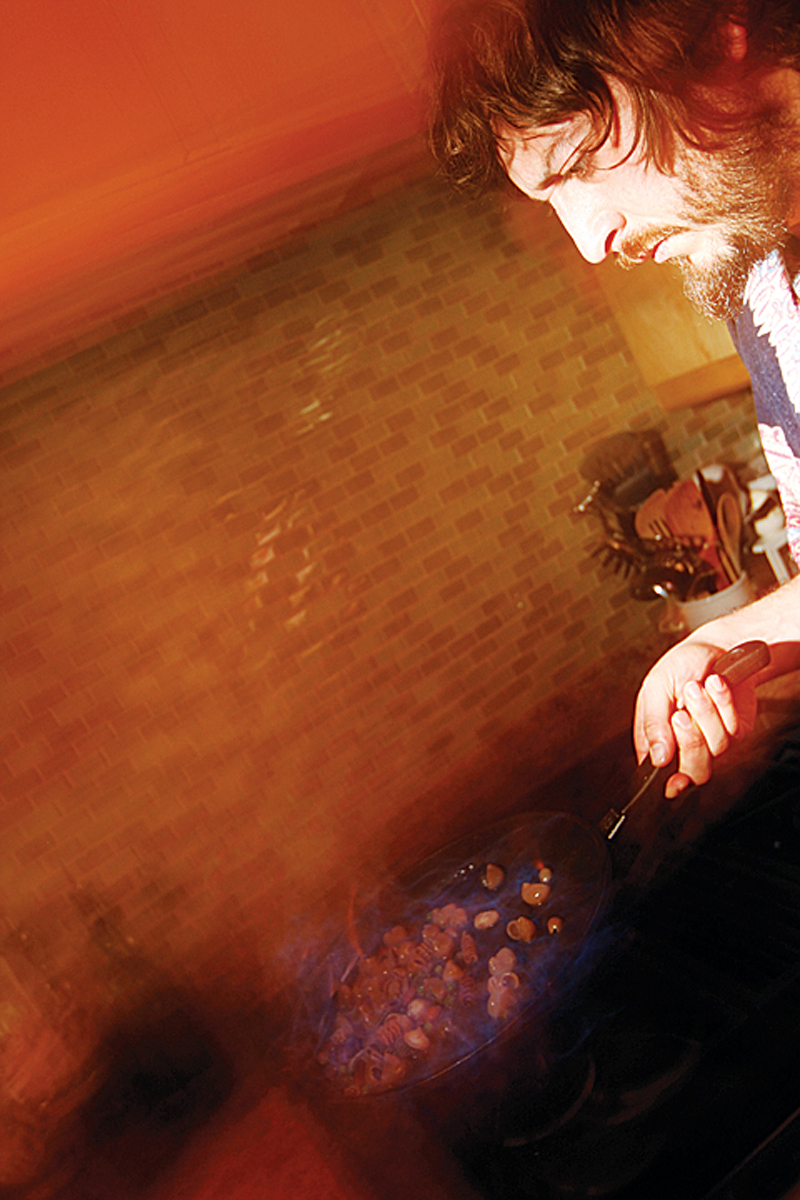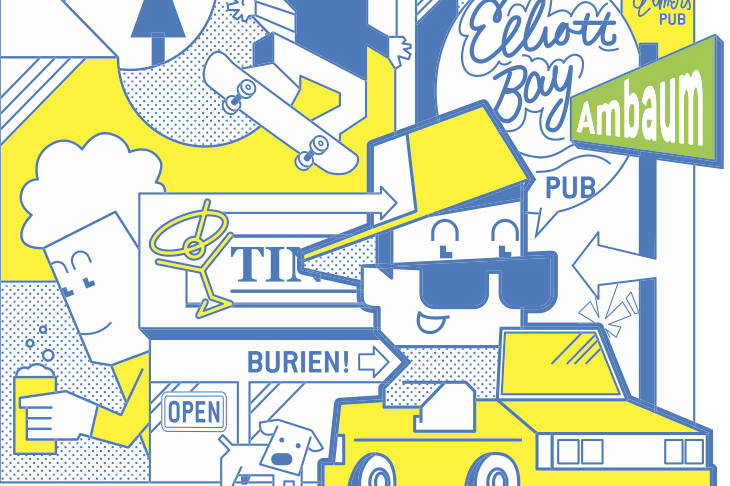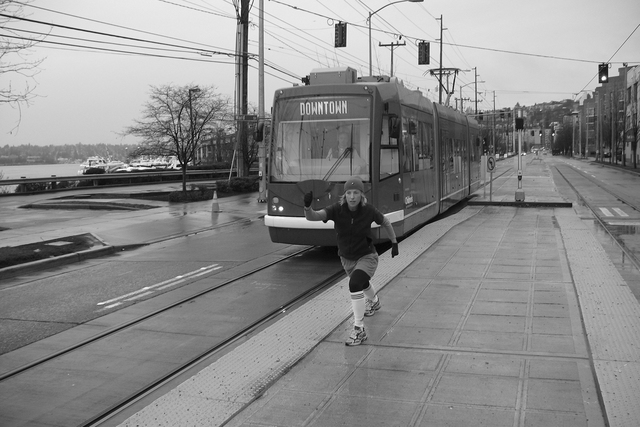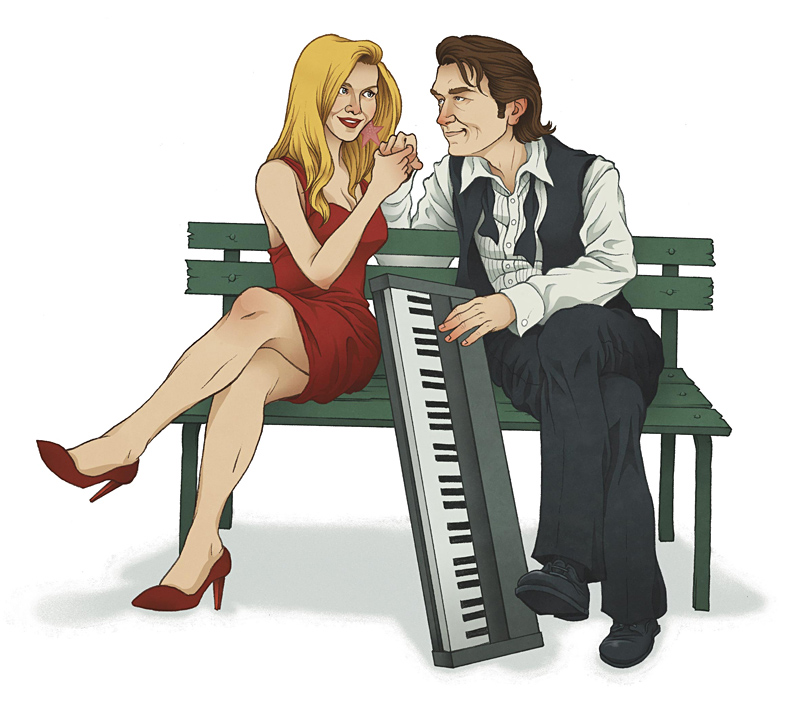Louis Kohl sleeps naked, with only a moleskin quilt and an African/Native American jazz bassist masking his enormous wang from the wildlife near Denny Creek. A Marquardt bull, said to be the most unpredictable of all bulls, peeks in his bedroom window, causing Kohl to stand at attention. He dons a pair of loose-fitting hemp pants and walks briskly to the closet in his hand-forged foyer. There, he puts on a wool jacket and grabs a pair of brass knuckles, bequeathed to him by the legendary Norse forager Klaus Sveidenkrandt.
The hirsute, wiry Kohl, who resembles the musician Dan Bejar (Destroyer, New Pornographers), inhales a line of 100-percent-pure cocaine—grown in his backyard—and walks outside. The bull has moved to within 20 feet of him. It’s not the bull that charges Kohl, but Kohl who charges the bull. Employing a jiu-jitsu tactic, Kohl snaps one off of the bull’s horns and then throws an uppercut to its face. The bull is dazed, and Kohl is ruthless. He puts his brass fists to the bull’s testicles in rapid succession, rupturing them. He then grabs a hunting knife from his belt and cuts an incision in the bull’s chest. Blood and guts come rushing out. Kohl reaches into the bull and pulls out its heart. He takes a gigantic bite, then feeds the rest to a flock of rare Peruvian hens.
Waking up next to beautiful women, snorting DIY cocaine, and killing a wild animal many times his size for breakfast are regular occurrences for Kohl, whose rural bistro, The Dirt Farm, is easily the area’s most exclusive. Kohl has neither telephone nor computer; to make a reservation at The Dirt Farm, a prospective diner must master an obscure Sioux turkey call, record it on audiocassette, and mail it in care of the Mt. Si Tavern, where Kohl picks up his mail. If Kohl deems the turkey call sufficient, he will mail the prospective diner a date and time when she is to show up. Upon arrival, the reservation holder is required to consume two red eyes (beer and tomato juice) and play a game of horseshoes against a regular named Todd. If the reservation holder fails to beat Todd, she is instructed to return home immediately, and is permanently banned from requesting access to The Dirt Farm. If the reservation holder beats Todd, he summons his boyfriend, Julian, who blindfolds her and guides her into the back of a black Lincoln Town Car outfitted to run on oven grease.
Twenty minutes later the car stops, the blindfold comes off, and the diner is greeted in a verdant mountain holler by Kohl, who is usually naked or close to it. The diner is then asked where each article of her clothing comes from. If any of the clothing is manufactured outside of a 60-mile radius, the diner must remove the article in question and relinquish it to Kohl. If she refuses, she’s re-blindfolded by Julian and driven back to the tavern.
Kohl’s 60-mile rule represents a tremendous concession. Everything Kohl serves at his restaurant or uses in his home is produced within roughly a football field’s length of the property. Kohl hates labels, but nonetheless refers to this as “the 100-yard diet,” an unveiled dig at the 100-mile diet craze that’s permeated the Pacific Northwest in recent years. Kohl says 100-mile diets “are for slackers,” and that any chef who doesn’t grow, raise, and kill his own food—all of it—is “a coward.”
The only glint of hypocrisy evident in Kohl’s dogmatic regimen is his girlfriend, Portland-based jazz bassist and singer Esperanza Spalding, who recently beat out Justin Bieber for the Best New Artist Grammy even though she’s been making music for more than a decade. Spalding and Kohl see each other two weekends per month, and always meet in Kohl’s holler, which he steadfastly refuses to leave. When Spalding travels to The Dirt Farm, she does so in a glider constructed by Kohl that runs on recycled calf urine. Her stand-up bass needn’t travel with her because he’s built her a bass from a rare Nairobi pecanwood tree on his property. He’s also built her a studio from that same wood.
Kohl likes his girlfriend’s music, but not as much as jazz-pop megastar Christopher Cross’. The artist who recorded “Sailing” and the theme from Arthur may have seen his fame fade stateside, but he remains huge in Asia. When Kohl was starting out, long before “locavore” made its way into the culinary lexicon and people were willing to drop a week’s pay on a prix fixe farm-to-table experience, it was Cross who steered wealthy Asian businessmen to Kohl’s hideaway. Back then, he was happy to have the business, and allowed his customers to keep their sport jackets on and dine dogma-free.
But now, Kohl is able to push his dictatorial nature to its outer limits, revered and patronized by a farm-fetishizing cabal of Seattle-area gastronomes for whom standards like taste and tenderness are afterthoughts when pitted against modern cuisine’s measures of the moment: proximity and ethical sanctity.
After his early-morning bull kill—a ritual Kohl mockingly refers to as “brass-fed beef”—he fetches his mobile butchering unit and quarters the animal where it lies. Nothing goes to waste, not even the bullshit, which is used to fertilize a garden in which mustard greens, edible flowers, and coca are grown.
Kohl harvests the bull’s organs and takes them into his enormous kitchen, which doubles as his restaurant’s kitchen, just as his dining room doubles as the restaurant’s dining room. He pan-sears the animal’s eyeballs and vacuum-seals its pancreas in a marinade of housemade pickle juice and dark rum. (Kohl distills his own liquor onsite. In fact, every ingredient Kohl uses in every dish is produced onsite, with no exceptions.)
When the eyeballs are done, Kohl grates raw shards of the bull’s bladder over the dish, like Parmesan. He then takes the pancreas out of the induction chamber and garnishes it with beet jelly.
Spalding comes into the kitchen, looking a tad peaked. “Soup’s on, baby,” says Kohl, beaming at the musician as he pours her a smoothie consisting of kiwi, carrots, fava beans, and coyote bile.
Kohl grew up rich on a sprawling country estate in Wisconsin, the state which birthed the Kohl’s department store empire. This is no coincidence—it’s Kohl’s family’s business, one he’d be in line to take over if he wanted to, which he doesn’t. He views the enterprise—made-in-China here, imported-from-Panama there—as the antithesis of the values he espouses at The Dirt Farm.
“When I was 16, my dad made me work in the men’s-underwear department,” he explains. “I got fired after one shift because I refused to sell anyone underwear. When a man would bring a three-pack of boxers to the counter, I would tell him that the power on all the registers was temporarily out, and that he’d have to come back later. I mean, what’s the point of underwear? Pants barely make sense to me.”
Kohl attended college at France’s hyper-exclusive Guillaume Academy, which had a liberal curriculum that allowed students to create their own course of study. Kohl majored in hunting, and proved to be a savant. But he had no stomach for firearms. The objective of hunting, he believed, was to eat what you killed, and buckshot or lead irrevocably tainted what ended up on the plate.
Adrift, Kohl met Sveidenkrandt while attending a private Chemical Brothers concert thrown by the son of a billionaire Danish bank executive. The two men were drunk on a nameless liqueur that Sveidenkrandt had extracted from a rare strain of cactus in the New Zealand outback when the host rudely told Sveidenkrandt that he was too old and would have to leave. In turn, Sveidenkrandt slipped on a pair of brass knuckles and killed the host with one punch. A lightbulb went on in Kohl’s head. He told Sveidenkrandt he’d be happy to take the murder weapon off his hands (literally), and produced the lethal knuckles he uses today from a cast of that initial pair.
After graduating from Guillaume, Kohl apprenticed in Saigon under famed Latin-Thai fusion chef Chuy Sing-Pai. Kohl says he learned virtually everything from Sing-Pai, including how to grow coca in abnormal climates and distill it into pure, snortable powder. The purity, Kohl reasoned, freed it of its taboo. Nowadays, he casually offers cocaine to guests as though it’s high tea, and offers a $1,000-a-night “coca package” to Dirt Farm patrons who want to stay up until sunrise, inhaling the stimulant and talking in paragraphs.
It was in Asia that Kohl first encountered Christopher Cross. Kohl was backstage, wishing Michael McDonald were there to sing his signature hook on “Ride Like the Wind” instead of Cross’ Laotian xylophone player. He voiced his complaint to Cross as the portly crooner walked offstage. Rather than taking offense, Cross told Kohl he admired his gumption—McDonald was subsequently summoned for the balance of the “Stations of the Cross” tour—and invited him to a sweat lodge on the outskirts of Tokyo. There, they hung out in robes and discussed culinary philosophy.
When Kohl exited the grounds, he did so with a coffin full of gold bullion from Cross’ vault, on the condition that he use it to finance an ethically stringent restaurant in the Cascade foothills.
The phase of Kohl’s life when he traveled the world and let its various influences seep into his psyche ended when he purchased his land in the remote Cascade holler near Denny Creek. He’d absorbed all he could, to the point of saturation. The Dirt Farm was where he would fuse those influences into a hyper-disciplined culinary doctrine, and his commitment to it in the decade since has been monastic.
The Dirt Farm is not open every night. It’s open when Kohl feels like opening it, which tends to be, on average, twice a week. If enough guests flip for the coca package, he’ll occasionally opt to cook on back-to-back nights, but he’s under no obligation to do so.
Dinner at The Dirt Farm costs $500 per person, and Kohl will typically feed 40 patrons at a time, all of whom sit at a communal table made out of tightly bundled wooden sticks which Kohl gathered and glued himself. He made the glue, too, without the aid of chemical agents. He employs no paid staff, but is typically assisted by two Thai apprentices of ambiguous age and gender, with whom he sleeps when Spalding isn’t around. When she is around, they sleep in the barn, so as to study the habits of the animals which they must nurture and, conversely, kill when Kohl is busy foraging in the adjacent woodland.
On a Saturday, Kohl permits me to stand in for Julian, his Town Car driver. On the bed in my guest room, Kohl lays out the ensemble that I am required to wear: sandals with sheep’s-wool footbeds, a pure cotton T-shirt with the letters “TDF” hand-stitched onto its chest, and a pair of denim shorts similar in length to those worn by David Cross’ never-nude psychotherapist in Arrested Development. I drive to the tavern, sit down, and order a red eye.
An attractive couple from Medina arrives first—he a silver fox in his 50s, she a petite brunette in her 30s. Their names are Ted and Tanya, and Todd instantly recognizes them as Dirt Farm aspirants. He orders them four red eyes and escorts them to the horseshoe pit. Tanya is a good player, and defeats Todd. Ted is horrible, and does not. Ted assures Tanya that it’s fine to carry on without him, then heads back to Medina in his Infiniti sedan.
I blindfold Tanya and guide her to the back seat, pushing her head down like a police officer. Kohl has instructed me not to make small talk; Julian tells me he’s required to record every trip he makes and submit the cassettes to Kohl for review. After 20 minutes of silent driving, we reach The Dirt Farm.
Kohl is wearing only a short-cut kilt—a mani-skirt, really—when he greets Tanya. He inspects her ensemble. Evidently she’s caught wind of his “wear local” edict, but has on a sundress made in Whatcom County, which is outside the prescribed radius. Kohl instructs her to take it off, which she does without argument. She’s aware of the rules, and to submit totally to Kohl’s whims is, in large part, why she’s made the pilgrimage. Julian takes the keys from me and heads back to the tavern to pick up three more couples (the Town Car has been retrofitted to feature bench seats in the back which face each other).
After several hours’ worth of shuttling, 36 guests are seated for dinner (16 more failed to beat Todd at horseshoes and were sent home), some without shirts and others without pants or shoes, which have likely already been incinerated in the complex heat-recycling system Kohl installed in his restaurant. Seven guests have purchased the $1,000 coca package, although any of the 29 remaining may opt in at any point in the meal. The powder is, however, kept in a secure area until after dinner due to its tendency to suppress appetite.
Silence is golden to Kohl, as evidenced by the no-talking-in-the-Town-Car rule and the requirement that, while they wait (and wait) for their fellow patrons to arrive, all guests are required to sit silently in a massive gazebo on the northeast corner of his property and read either Philip Roth, Malcolm Gladwell, or National Geographic. But once he starts cooking, music becomes an important component of the Lou Kohl Experience. He occasionally hires local musicians Kaylee Cole and Choklate to perform during dinner (or in Choklate’s case, dessert), and Spalding will sometimes indulge guests in a long bass solo while they eat. When Kohl has not booked a performer, he plays one of four artists, at top volume: Christopher Cross, Oingo Boingo, The Magnetic Fields, or Creed. Except when he cooks fish; then he plays Phish.
For supper, Kohl serves a menu of braised duck intestine with a cedar-sap reduction, black bear belly infused with opium and frog plasma, catfish sashimi, beer-battered blue jay brains with a raspberry demiglaze, potbellied pig heads stuffed with snap peas and maple yogurt, and candied ladybugs for dessert.
Midway through dinner, Kohl notices that Tanya, who has purchased the coca package, is not eating her bird brains. Kohl gets up from his seat, pulls Tanya’s chair out from under her, and summons Julian to drive her back to the tavern. She is not refunded her money, and is still not wearing any pants. But she has broken one of Lou Kohl’s rules, and Lou Kohl’s rules are not to be broken.
On the first weekend of each August, Kohl hosts an invitation-only bacchanal on his property called the “Hoot in the Holler.” The 69 invitees—homage to The Magnetic Fields’ 69 Love Songs—are a mix of well-known chefs, musicians, thespians, and culinary gadflies.
For his guests, Kohl reserves a block of space at Suncadia, a resort in Roslyn, and has them transported en masse to his property in a vintage school bus procured from Ken Kesey. They are not required to beat Todd at horseshoes prior to departure and are spared the standard clothing inspection, but the blindfolds remain mandatory, and small talk is disallowed. Julian, who earned his commercial license exclusively for the chore, is the designated driver.
On the day of the Hoot, Kohl permits the author Michael Pollan, who is in talks to write a book about The Dirt Farm, to access the grounds early to assist in preparations. Pollan was instructed to wear knee-high galoshes, rubber gloves, welder’s goggles, and a white lab coat from Kiehl’s. When Julian drops him off, Kohl escorts Pollan into his hen coop and hands him a machete. He then tells Pollan to cut the head off every hen, a request which seems to repulse the author. “I’m not fucking asking, Michael!” Kohl says. “If you don’t lop off every last one of those hen heads, I’ll have Julian drive you right back to the tavern.”
Pollan grudgingly decapitates the hens, then is led to a large shed and handed an icing gun filled with bronco semen. After inseminating half a dozen cows, Pollan is blindfolded and told to open his mouth. Kohl pours a large quantity of Chartreuse down Pollan’s throat, enough to ensure the Omnivore’s Dilemma author will be at least mildly inebriated when the rest of the guests arrive. After Pollan swallows the liquor, Kohl puts him in a submission hold which renders Pollan unconscious, then has his Thai apprentices give the author a deep muscle massage before transporting him to a guest cottage in a wheelbarrow.
Pollan wakes up an hour later, half-drunk yet fully refreshed, to find Kohl suffocating a 9-year-old thoroughbred named Gumbo Ricky. After choking the life out of the horse and harvesting his innards, Kohl has Pollan assist him in threading a metal rod through Gumbo Ricky, so as to cook him rotisserie-style over a fire pit. Before starting the fire, Kohl instructs Pollan to remove the horse’s teeth with a set of pliers, as well as season its entire corpse with a rub consisting of cumin, butterscotch, peat moss, and salt brine.
Once the horse begins slow-roasting, Kohl leads Pollan into the kitchen, designates the author as his sous, and reveals the night’s menu: poached seagull served on a bed of cottage cheese, fried emu wings mounted on a foundation of chicken-liver paté, sautéed rattlesnake brushed with tarragon and pear moonshine, and, of course, the horse, which guests will be required to self-quarter in the spit while standing shoeless on scalding embers.
At 5:47, Julian pulls the bus into the holler. The actress/singer Zooey Deschanel is the first to emerge, guiding her husband, Death Cab for Cutie’s Benjamin Gibbard, out the door by hand. She approaches Kohl, intent on embracing the mercurial Dirt Farm proprietor, but he strikes a posture which makes it evident that platonic touching isn’t his thing. For Kohl, such intimacy is reserved exclusively for killing or lovemaking.
Deschanel and Gibbard are followed by the other 66 guests, a group that includes: Spalding, Cross, Michael Hebb, Stanley Tucci, Ben Harper, Laura Dern, Linda Derschang, Gabriel Claycamp, Matt Dillon (the Corson Building proprietor, not the actor), Jason Wilson, Stephin Merritt, Keren Brown, Colin Meloy, Geoffrey Zakarian, Carrie Brownstein, Anna Faris, Kurt Timmermeister, Marcus Charles, Gwyneth Paltrow, Terence Trent D’Arby, Leslie Feist, Stone Gossard, Maria Hines, Steve Martin, Rachel Yang, Penn Badgley, Tamara Murphy, the Canlis brothers, Dave Matthews, Sarah McLachlan, Edward James Olmos, Alice Cooper, Foxy Brown, Adam Richman, Alex Guarnaschelli, David Eggers, Sarah Polley, the Avett Brothers, and Dame Helen Mirren. (Bono sent his regrets.)
Kohl has suspended his silent-reading rules for the evening, inviting his guests to sip mead and snack on house-cured sardine flanks in a pasture instead. Kohl heads back to his kitchen, where Pollan is sequestered, doing prep work with the assistance of the two Thais. Kohl does a line of his homegrown blow, puts on a pair of riding boots, and heads into the woods, beyond his property’s border. There he encounters a llama named Lucky. Only Lucky won’t be so lucky tonight.
Kohl approaches the llama gently, and is soon astride it, beckoning it into the pasture. The assembled throng smiles collectively at Kohl and Lucky as they approach. When Kohl reaches the group, he kisses the llama tenderly on the nose before sweeping its front legs, causing Lucky to fall headfirst into the dirt. It dies upon impact.
As Lucky drifts into the sweet hereafter, three members of Ivan & Alyosha emerge from the barn and begin singing a Civil War–era hymn. At the song’s conclusion, Kohl steps in front of the slain llama’s corpse and says, “Now, who wants to say grace?”
“I do! I do!” yells Pollan, positioned several yards away near the kitchen’s rear entrance. The crowd turns to recognize the famous author, and lets out an uproarious, self- satisfied whoop. What a Hoot, indeed.
